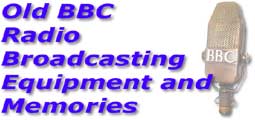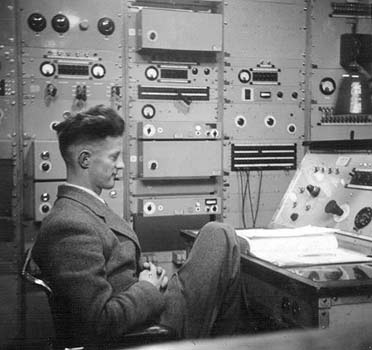
Joe in the Washford Control Room on 1st February 1949.
I joined as a Youth in Training and the first five weeks were taken up with an excellent course run by Mr Lowry - the On-Station Instructor. I had vaguely heard of Ohm's law but little else that would help towards my understanding of the workings of high-powered transmitters.
Before I left Droitwich in November I had started up the 5XX 230kW transmitter on my own, without supervision, so that it was ready to go on the air.
Starting it up meant starting the water pumps for valve cooling and "peeing" each of the valves to make sure there were no air locks in their water jackets.
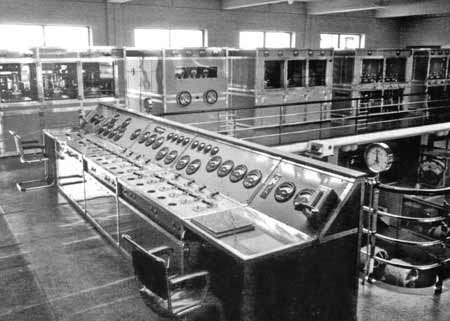
I often cycled from Worcester for nightshift which started at midnight 'til 0930 and sometimes was accompanied by a few German bombers flying overhead. They never stopped at Droitwich I'm pleased to say! It was a wonderful station, with its 700ft masts, and I really enjoyed my first taste of the BBC.
Next I went to Maida Vale for the A1 course and after Christmas to Daventry for the B1 course - I was then promoted to Technical Assistant Grade II and posted to Washford - I'd never heard of the place until that moment.
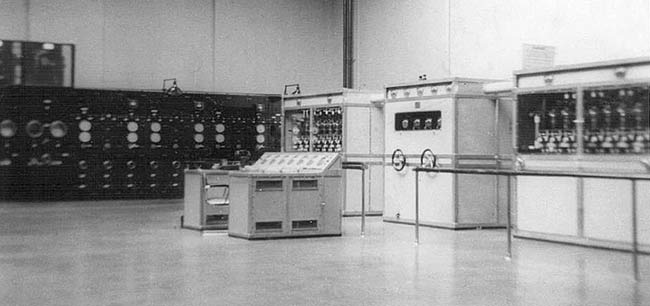
This view shows the control desk and the C2, D and
C1 units. C1 & 2 were the final amplifiers working in push-pull each
having 8 (one spare) CAT (cooled anode transmitting) valves working in
parallel - their outputs were combined in the D unit and then via feeders
to the ATH (aerial transformer House) and thence to the aerial.
Washford
One of the earliest BBC transmitting stations.
It opened in 1933, housed the first broadcast transmitters in Somerset
and was the first high-powered broadcasting station in the SW of England.
It currently radiates BBC Radio Wales.
We had one day off a week starting on Monday one week then Tuesday the next and so on, so that every seven weeks you had a long week-end off i.e., finish Friday at 1400 and start again at 1400 the following Monday.
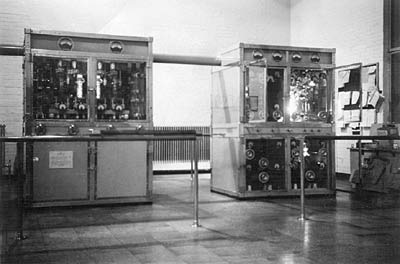
This picture shows the B and A units. The carrier was
modulated by the programme signal in the A unit and the B provided the
first stage of amplification.
In October 1944, a young lady arrived from Weymouth H-Group transmitter and was posted to our shift - Sylvia Beechey by name. Years later, in 1949, we met again at 200 Oxford Street. She became Sylvia Latham on November 25th 1950 and we shared 61 years of marriage.
To get from TA ll to TA l you had to take a practical test on station with the EiC in attendance - starting up one of the diesels (450 hp marine driving one of the 220volt DC generators) and connecting the latter's output on to the main switchboard; starting up various sets of machines; putting batteries on charge; answering questions about the transmitters and so on. Sylvia and I both passed this test during our stay at Washford.
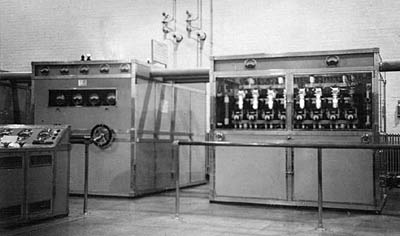
The D and C1 Units
Round about D-day the frequency of one of the transmitters was changed. Rumour had it that we were on the same frequency as Calais so that German aircraft could not use it for direction finding. The transmitter was "switched on" from somewhere in London and the whole thing was called Operation Bareback - I never did find out too much about it - hush hush, you know!
Joe briefly describes the rest of his BBC career:
Before the war ended, I served as a Radio Mechanic in the Royal Signals - my National Service lasted for two years eight months. On de-mob, I rejoined the BBC in Radio OBs for the period of the Olympic Games. Shortly after, I
Related page
In 1962 I got the job as SSM Central Unit at BH and later as Operations Staff Organiser, Chief Production Services Manager and eventually Head of Programme Operations, Radio. I retired at the end of December 1983 - over forty years since joining. The two jobs I enjoyed most in the BBC were being a TA I at Washford and working as an SM at 200 Oxford Street.
On retirement I was able to concentrate more on watercolour painting and have sold more than 550 pictures since then. In 1997 I was elected a full Member of the Guild of Aviation Artists and won the award for best watercolour - who says there's not life after work?
Joe was to enjoy many years of life after his retirement but sadly he died in February 2012 after a brief illness and just two months after losing his wife Sylvia. Peter Thomson remembers him...

Joe, left, training in The Langham in 1962.
I was delighted when Joe was appointed Head of Programme Operations, and I am sure everyone else in the department was too. Even in this position, I think staff had no qualms about approaching Joe for help on difficult matters, and I'm sure they received sympathetic and helpful advice. I know I did on several occasions. Secretarial staff, too, had affection and respect for Joe. One of his secretaries, Chrissy, left to manage a pub with her husband in Notting Hill Gate, called the Sun in Splendour, and it became a habit of some of us to visit this establishment from time to time. I'm not sure of the exact sequence of events, but probably after retirement, we continued this practice inaugurated by Joe, and met in pubs near Broadcasting House. It is with great pleasure that I can say these meetings still take place once a month, and are known as SinS, and recently we have been joined by friends from Control Room and OBs.
Joe was a founder member of the Ariel Wine and Beer Society, and again I am grateful to him for introducing me to this group. The meetings are most enjoyable, and I have made a number of new friends from other departments. Another bonus is that Andrew, his son, has been the Chairman of the Society for a number of years.
Sadly, Joe had not been able to attend any of these meetings for quite some time because he was uneasy about leaving Sylvia, although I am sure he must have had offers of help from the family.

One of Joe's many paintings of Broadcasting House and
All Souls Church.
Having looked after Sylvia for so long, her death must have affected Joe profoundly, although he seemed to be coping remarkably well afterwards, and I was very pleased that a few weeks later, we met for lunch in a pub. Joe was quite cheerful, and said that we must do this again, and invite a few friends to join us. So it was a shock to receive Andrew's e-mail telling me that Joe had been admitted to hospital, and a greater shock when Andrew rang me a few days later to tell me that Joe had died earlier that morning. Just could not take it in.
I was pleased that I was asked to play the organ for Sylvia's funeral, and Andrew asked me if I would play for Joe's too. I decided that I would not, as I felt I would rather sit in the congregation and be a part of the Service. I'm glad I did, as I was amongst other BBC friends.
We will miss Joe, but will continue to remember him at our SinS and AWBS meetings, and of course, when we look at his paintings.
May Joe and Sylvia rest in peace.
Peter Thomson.
